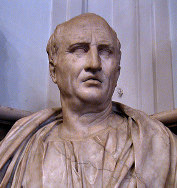|
Home
|
Apr 6, 2009
This week's themePeople who have more than one word coined after them This week's words ciceronian maudlin hermetic Cadmean victory pickwickian 
A bust of Cicero at the Capitoline Museums, Rome
Photo: antmoose
 Discuss
Discuss Feedback
Feedback RSS/XML
RSS/XMLA.Word.A.Day
with Anu GargWinning even one Nobel Prize is a big deal. Marie Curie received two (in physics and chemistry). But then hers was a family of high achievers: her husband, their daughter, and their son-in-law were also Nobel laureates. Similarly, having one's name turned into a word in the language is a rare feat. Yet there are some, both real and fictional characters, who have accomplished this more than once. This week we feature five such people. And Marie, well, she too had had two words coined after her: Curie, a unit of radioactivity, and curium, a radioactive element. ciceronian
PRONUNCIATION:
(sis-uh-RO-nee-uhn)
MEANING:
adjective:
In the style of Cicero, marked by ornate language, expansive flow,
forcefulness of expression, etc.
ETYMOLOGY:
After Marcus Tullius Cicero, Roman statesman, orator, and writer
(106-43 BCE). Another eponym derived from Cicero's name is cicerone
(a tour guide).
USAGE:
"Oxford University mooted the idea of establishing a business school six
years ago, prompting 500 black-gowned dons to storm into the 17th-century
Sheldonian Theatre in protest. Harvard's business school dates from 1908.
Cambridge succumbed in 1990. But outraged Oxonians unleashed volleys of
Ciceronian oratory, arguing that the groves of academe should be out of
bounds to commerce."Tara Pepper; Oxford's Business Blues; Newsweek (New York); Sep 2, 2002. "Voices in the wilderness rarely speak in perfect Ciceronian cadences; why must we call (Edward Durell) Stone's work to such strict account?" James Trilling; A Piece of History; The New York Times; Apr 16, 2000. A THOUGHT FOR TODAY:
Some men of a secluded and studious life have sent forth from their closet or their cloister, rays of intellectual light that have agitated courts and revolutionized kingdoms; like the moon which, though far removed from the ocean, and shining upon it with a serene and sober light, is the chief cause of all those ebbings and flowings which incessantly disturb that restless world of waters. -Charles Caleb Colton, author and clergyman (1780-1832)
|
|
Subscriber Services
Awards | Stats | Links | Privacy Policy
Contribute | Advertise
Awards | Stats | Links | Privacy Policy
Contribute | Advertise
© 1994-2025 Wordsmith